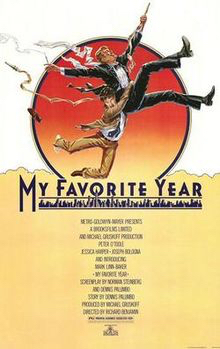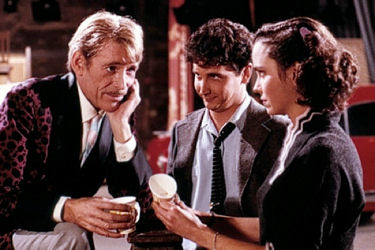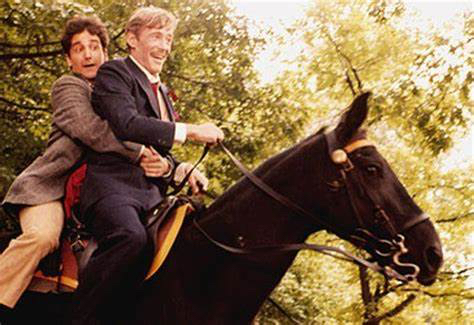Week of March 22 – 28, 2020
Nostalgia fuels my fourth sheltering choice. When done right — and I think this film does it right — nostalgic movies can be amazingly comforting as well as brightly entertaining. I’ve loved My Favorite Year since it debuted in 1982, and I still think it holds up extremely well. I think you will agree.

The year is 1954, and television comedy shows are broadcast live. Young writer Benjy Stone (Mark Linn-Baker) is writing for the “Comedy Cavalcade”, hosted by King Kaiser (Joseph Bologna) and its guest for the week is legendary adventure actor Alan Swann (Peter O’Toole). What nobody knows is that Swann is a legendary lush, and that he hasn’t done anything “live” in almost thirty years.
This is the setup for the clever and zany comedy which follows, based in part on the early career of a young writer named Mel Brooks when he worked on Sid Caesar’s television variety series “Your Show of Shows.” In fact, many of the “Comedy Cavalcade” characters are based on real-life counterparts, some of which became very famous — but you don’t need to know any of this to enjoy the film. The references are there, and the in-jokes are funny enough to merit their inclusion beyond the mere fact that they were real long before this particular project was conceived.
This is Richard Benjamin’s first feature film as a director. Benjamin, who was a major actor of the early 1970s (Goodbye Columbus, Diary of a Mad Housewife, Portnoy’s Complaint, Westworld, etc.) had seen his career slow down and was looking to expand his horizons when this opportunity arose. He had actually worked at 30 Rock for NBC as a page during the 1960s, so he knew the territory pretty intimately. Mel Brooks’ company helped produce the film and Brooks made himself available to answer questions about the era and the people involved. All this inside information contributes to the realism and effectiveness of the film, making the movie crisp and sharp and clever and funny.
And funny it is. The television comedy show setup is funny, whether it involves the infighting of the writing staff, the insecurities of leading man King Kaiser (Bologna), the romantic innuendoes, or the myriad of things driving producer Leo Silver (the legendary Adolph Green) to distraction. Then there’s Benjy’s family, the Steinbergs who live in a whole other world called Brooklyn. At one point Benjy brings Alan Swann home to dinner, which is one Swann is never likely to forget. Lainie Kazan plays Benjy’s proud mother Belle; she was nominated for a Golden Globe award for her portrayal, and she is the only member of the movie to make the move to the Broadway stage when the film was adapted and staged for a brief run in the early 1990s (where she was then nominated for a Tony award).

K. C. Downing (Jessica Harper).
The story centers on Benjy — his status as the newest and youngest writer on the staff (and therefore, the most vulnerable); his obnoxious romantic pursuit of production assistant K. C. Downing (Jessica Harper); his efforts to leave his ties to his embarrassing Brooklyn family behind; and most of all, his relationship with Alan Swann, whom he is assigned to babysit during the week leading up to the live performance. Benjy adores Swann the actor, but is aghast at the man’s excesses as he gets to know him. Where the story hinges, however, for me at least, is that Swann genuinely takes to Benjy. If it had been written that Swann was an egotistic monster, taking advantage of everyone without regard to feelings, this story would never work. Instead, Swann is fully aware of his failings, embraces his situation, charms the pants off of people and is as honest as he can be with his young handler. Their relationship is the soul of the movie, culminating in an early morning walk through Central Park and then a wild horseback ride as the sun rises. That sequence is the most magical in the film for me, and probably for Benjy as well.
The film works as well as it does because of Peter O’Toole. A legendary actor, this role is perfectly suited to him. Based on Errol Flynn, of course, Alan Swann is a matinee idol gone to seed, still hugely famous and still devilishly handsome, but rather lost as a human being. He loves being famous even as he realizes that fame completely controls how people see him, react to him, and want things from him. Swann has made peace with that, but not yet with the one thing in his past that haunts him — the young daughter in Connecticut that he hasn’t seen for over a year. O’Toole knows how to convey the heartache beneath the smiling bluster, and he does it beautifully. His performance is effortlessly charming, utterly believable and often hilarious. It earned him his seventh Oscar nomination and, in another year, he might have won. His performance carries this movie to greater glory than it would otherwise have earned — and it is a very good movie already.

Then there is the big finish. A lot of comedy films try to climax with a big, action-packed finish. This time it works. First, there’s some genuine drama, sprinkled with hilarity, when Swann learns that the broadcast is actually “live.” He has a full-fledged panic attack and leaves the premises, even as the show begins and King Kaiser’s “Boss Hijack” sketch opens with a time-delayed bang. Swann and Benjy have a brutal heart-to-heart talk, and then Swann makes his grand entrance from the balcony. A funny, intricately choreographed fistfight occurs and the good guys win. Kaiser addresses the audience and introduces Swann, who takes his well-deserved bows. That image, with Alan Swann humbly acknowledging the love of a live audience for his years of swashbuckling and pretending, is pure magic. It is just right. So much of this film is just right; that’s what makes it so memorable to me.
Nostalgia is more than just the recitation of the past. It involves recreating the feelings and emotions that made something so impactful in the first place. It involves heart. My Favorite Year is full of heart, from recalling the pain and glory of writing live television comedy to finally making a real, romantic connection to gently deconstructing a living legend. It evokes a time when the colors seemed brighter, the tastes seemed sharper and the going a little easier. Or at least easier to understand. I wasn’t even alive in 1954, but this movie makes me wish I had been. That I could have worked in such an environment, known such people, been swept up in such events and made such fond memories. That’s what the great movies do, and what this one does so well.
I used to give My Favorite Year four stars, but I have lowered that rating a bit over time, due to the silly, rather out-of-touch binge-drinking scenes and Benjy’s obnoxious pursuit of K. C., which I have always found rather sour. Still, I’ve settled at three-and-a-half stars because this movie brims with so much charm and heart. Watch the scene in the Stork Room, when Swann dances with Mrs. Horn (Gloria Stuart, making her first film appearance since 1936!), and you can’t help but be moved. Or enjoy pure astonishment when Herb Lee (Basil Hoffman) finally makes his feelings publicly known. It’s a wonderful movie that is available on DVD and available for streaming. It’s well worth a trip down memory lane. ☆ ☆ ☆ 1/2. Backdated to 22 March 2020.
Similar movies include Yankee Doodle Dandy (1942); The Man Who Shot Liberty Valance (1962); Notting Hill (1999); and Stan and Ollie (2018).
